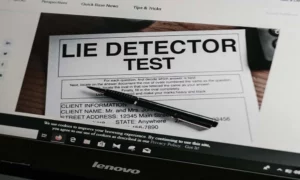Have you ever taken a test where the result was neither a clear “yes” nor a definitive “no”? This can be frustrating, particularly if the stakes are high. A polygraph is one such test that can leave you with a vague and ambiguous outcome.
An inconclusive result falls between the classifications of “truthful” and “deceptive.” Essentially, it means that the polygraph has not been able to determine with sufficient accuracy whether you are telling the truth or not. In some cases, it may be the consequence of external factors, such as anxiety or other forms of stress. In other cases, it may be due to the limitations of the test itself or because the examiner cannot make a definitive conclusion based on the data obtained.

This result can be frustrating and confusing, leaving you with unanswered questions about your honesty and integrity. However, it does not necessarily mean that you lied or that the test was flawed. Rather, it simply means that the data collected during the test was insufficient to make a final determination.
In the following sections, we will look at the possible reasons for an inconclusive result, the implications of it, and the steps you can take in response.
Reasons why an inconclusive result may occur
An inconclusive result could have a number of causes:
- Physical factors: Certain physical conditions can interfere with the accuracy of the polygraph. For example, if you are experiencing pain, discomfort, or illness during the test, it can affect your reactions and lead to an inconclusive result. Similarly, if you consumed alcohol or drugs before the test, it can interfere with results.
- Psychological factors: psychological elements like stress, anxiety, or nervousness can also lead to an inconclusive result. They can influence your bodily output and make it difficult for the examiner to differentiate between truthful and deceptive readings.
- Inadequate preparation: If you were not sufficiently prepared, Preparation involves being familiar with the testing process and having a clear understanding of the questions. If you are not properly ready, it can lead to confusion or misunderstandings, often resulting in an inconclusive result.
- Technical issues: issues like malfunctioning equipment, inadequate calibration, or errors in data analysis. These can lead to inaccurate or inconsistent results that do not provide a clear indication of truthfulness or deception.
- Unanswered or unclear questions: If the questions are unresolved or unclear, This may occur if the examiner does not ask follow-up questions or if the questions themselves are vague or open-ended.
- Test length: The length can also affect its accuracy. If it’s too short, it may not provide enough data to reach a definitive conclusion. Conversely, if the test is too long, it can lead to fatigue or boredom, which can affect your physiological responses.
- Examiner bias: If the examiner has a preconceived notion of your guilt or innocence, it can affect their interpretation and lead to a prejudiced result.
- Poor test conditions: poor test conditions, such as noise or distraction. If the testing environment is not conducive to accurate data collection, it can lead to unreliable outcomes.
- Inexperience or incompetence of the examiner: If the examiner is novice or unskilled, they may not properly interpret your physiological responses.
- Language barrier: If you are not fluent in the language used, it may be difficult for you to fully understand the questions, leading to unreliable readings.
- Interrogation techniques: The way the questions are asked can also affect the readings. If the examiner uses aggressive or intimidating interrogation techniques, it can lead to unclear or inaccurate results.
Potential Implications

One of the most immediate and likely implications is additional testing. Meaning you will be required to take another polygraph test, which might be time-consuming and stressful. Additionally, if the inconclusive result is related to an ongoing investigation, it may delay it or result in further questioning.
If you are getting evaluated for a job or security clearance, it can potentially lead to a loss of opportunities or clearance.
Finally, it can have negative mental effects. Regardless of whether you are innocent, it can cast doubt on your credibility and potentially harm your reputation. This is particularly true if the test is conducted in a public setting, as it may be misconstrued by the public or the media as a sign of guilt.
Legal Implications of an Inconclusive Polygraph Test Result
During legal proceedings
When it comes to legal proceedings, it can have significant implications. While polygraphs are generally not admissible as evidence in court, they can still play a role in investigations and plea bargains.
If results are inconclusive, it may not be helpful in convincing a prosecutor to drop charges or a judge or jury of your innocence. In fact, it may raise doubts and make it more difficult for your defense.
On the other hand, if you are the accuser and results are inconclusive, it may weaken your case and make it harder to get a conviction.
The mere fact that you received an inconclusive result may be seen as suspicious by law enforcement and lead to further investigations or interrogations.
How an inconclusive result may be viewed by the court or other legal entities
In some situations, it may be seen as neutral, and the legal authority may proceed with the case as if it never happened. In other cases, it can be viewed negatively, and they may interpret it as evidence of your deception or refusal to cooperate.
For example, the prosecutor may use an inconclusive result to suggest you are hiding something or not willing to cooperate. In contrast, in other cases, it may be viewed as a sign that the evidence against you is not strong enough to convict you, and the court may decide to dismiss the case.
Steps that can be taken to challenge an inconclusive polygraph result

If you believe that the result is inaccurate, you may want to take steps to challenge it:
- Obtain the test records: If you haven’t already, obtain a copy of your test records. These will include the questions asked, the physiological responses measured, and the examiner’s interpretation of the results.
- Review the records: Go over the records carefully to make sure that the examiner followed proper procedures. If you notice any discrepancies or irregularities, you may be able to use this to challenge results.
- Consult with a polygraph expert: Consider speaking with an experienced professional in the field of polygraphs who can review the test records and provide an opinion on their accuracy.
- File a complaint: If you believe that the examiner acted unethically or violated your rights, you may want to file a complaint with the appropriate regulatory agency. For example, in the United States, complaints can be filed with the American Polygraph Association or the National Polygraph Association.
- Request a retest: If you believe it was due to technical or procedural errors, you may be able to request a retest. Contact the agency or organization and explain your concerns. They may agree to administer a new one with a different examiner or under different conditions.
But most importantly;
- Stay calm: It can be a frustrating experience, but it is important to remain calm and not let your emotions get the best of you. Take a deep breath and remind yourself that there could be many reasons for which the test produced an inconclusive result.
- Ask for clarification: If you are not sure what the inconclusive result means or why it was produced, you can ask the examiner for clarification. They should be able to explain it to you and give you some idea of why it may have occurred.
Strategies for getting ready for a subsequent test or appeal

There are several methods you can use to increase your chances of success:
- Understand the process: Familiarize yourself with the requirements of the follow-up test and what will be expected of you.
- Review the questions: Review the questions that were asked and consider whether there were any ambiguities or misunderstandings. If so, make sure that you clarify them with the examiner prior to the subsequent test.
- Remain calm and focused: Finally, try to stay relaxed and laser-focused on the task at hand, avoid getting distracted or letting your emotions get the best of you.
Coping with the emotional and psychological impact
It can be a difficult experience. But keep in mind that an inconclusive result does not mean you are guilty of lying.
Acknowledge your feelings of frustration, disappointment, and even anger. They are valid and normal. However, don’t dwell on these for too long. Instead, try to focus on what you can control and what steps you can take moving forward.
One helpful approach is to seek support from loved ones or a professional therapist. Talking about your feelings with someone who understands them can help you process them and move on. Additionally, a therapist can help you develop coping strategies for dealing with any lingering emotions and work through any underlying issues that may have contributed to your inconclusive result.
Take care of yourself physically and mentally. Engage in activities that you enjoy, get enough sleep, and practice stress-reducing techniques such as meditation or yoga. It can help you feel more in control and better equipped to handle any challenges that may come your way.
Final Words

If you receive an inconclusive result, resist the temptation to draw conclusions or make assumptions about your guilt or innocence. Instead, focus on the facts of the situation and the possible factors that could have affected them. Seek out the guidance of a qualified professional who can help you interpret the results and provide you with support.
Best of luck!

